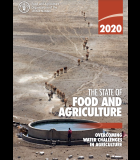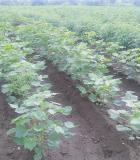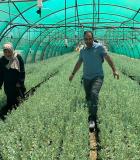Picture a rural household in Kisumu, Kenya. Kale, cowpeas, tomatoes, and butternut grow in a kitchen garden fed by a drip irrigation system. Family members harvest these vegetables for the stew that complements their diet, formerly reliant on maize and sorghum. Handwashing stations adjacent to the cooking hut and the improved latrine remind everyone to wash with soap at critical times. Thanks to a new community solar-powered borehole, the family is no longer solely dependent on what the rain provides for drinking water. The family garden produces more food than is needed, and the remainder is sold to provide additional income.
Unlike millions of Kenyans, this family is overcoming the cycle of food insecurity, diarrheal disease, malnutrition, and poverty with the support of USAID’s Kenya Integrated Water, Sanitation, and Hygiene (KIWASH) Project. Working to improve the lives and health of one million Kenyans in nine counties, the five-year project (2015–2020) focuses on the development and management of sustainable water, sanitation, and hygiene (WASH) services and increased access to irrigation and nutrition services.
Click here to read the full article in USAID's Global Waters magazine.






